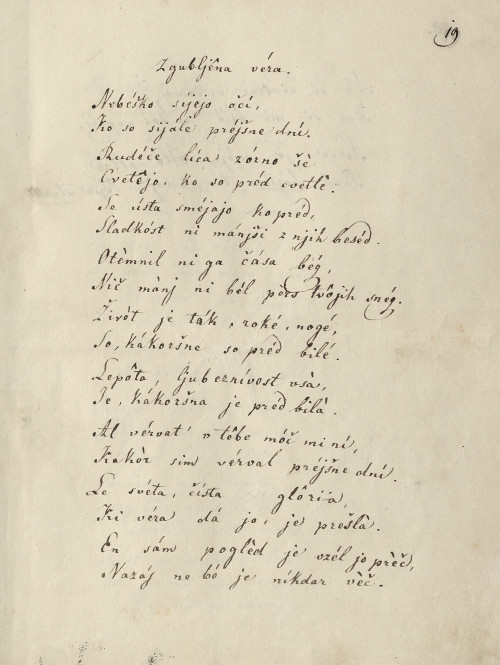France Prešeren and Slovenian Romantik
The biography of France Prešeren was approached through his literary work both during his lifetime and later, when he was already considered an indisputable classic of Slovenian literature. Among his contemporaries he had the reputation of a "poet of love". His verses were understood not only as a confession, but also as an autobiographical message.
The sonnet about Prešeren's first meeting with his great love, which begins with the verse Je od vesel'ga časa teklo leto (roughly: A year has passed since the joyous time), was first published in the collection Poezije (Poetries). The book was conceived as a kind of encyclopedia of the author's life and literary creative experience. The poem about the fateful encounter was placed immediately before the Sonetni venec (Sonnet Wreath), whose 14 sonnets each begin with a letter that, when put together, reveal the name of his unrequited love (Primicovi Julji). However, the date given by Prešeren of their first meeting in 1833 corresponds in day and month exactly to the time when Petrarch is said to have first laid eyes on his Laura in 1327, which means that this may also be about the creation of a literary autobiography and a romantic connection to the past.
The sonnet titled Marskteri romar gre v Rim, v Kompostelje (Many a Pilgrim Goes to Rome, to Compostela) was written after the sonnet wreath published in February 1834. The initial letters of the individual verses form the name Matevzu Langusu (a so called 'Acrosticon') and reveal the name of the painter who portrayed the poet's chosen one. Prešeren looked at the work in the studio. The distance from the beloved is also suggested by the use of metaphors that evoke the baroque captivity in opposites and contradictions.
By contrast, the poem Zgubljena vera (Lost Faith), first published in June 1842, does not attempt to evoke any historical style in the reader's mind. On the contrary, it is a thematization of love beyond idealization and romantic rapture. Instead of becoming a deity, the chosen one becomes a mere "beautiful thing".
The changes in Prešeren's perception of love indicate shifts in his understanding of poetry: the poet functions not solely as a narrator of emotions, but as an explorer of his own experience and existence. In his work, which does not shy away from exploring inner contradictions, he even spoke twice of the "sickening of life", that is, of an existence limited to mere endurance beyond joy and consolation.
